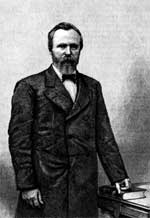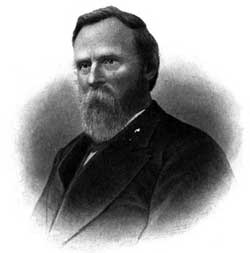Rutherford Birchand Hayes was elected the nineteenth President of the United States (1877-1881) in the closest electoral vote in the history of the United States. He was one of three chief executives elected whose opponent received more popular votes.

Born in Delaware, Ohio, on October 4, 1822, he graduated from Kenyon College, then studied law at Harvard University and set up a practice in his home state, becoming well known as a defense attorney.

 He moved to Cincinnati in 1850, and two years later he married his childhood sweetheart, Lucy Webb. Her nickname was Lemonade Lucy, since she allowed no alcohol to be served in the White House. Hayes is most known for his controversial election, which he won by only one electoral vote. His motto was "He serves his party best who serves his country best." He was a man of impeccable morals and profound fairness. He did what he felt was right without thought of what it might cost him politically. He moved to Cincinnati in 1850, and two years later he married his childhood sweetheart, Lucy Webb. Her nickname was Lemonade Lucy, since she allowed no alcohol to be served in the White House. Hayes is most known for his controversial election, which he won by only one electoral vote. His motto was "He serves his party best who serves his country best." He was a man of impeccable morals and profound fairness. He did what he felt was right without thought of what it might cost him politically.
In 1856 Hayes supported the Republican Party and their position against slavery. His hopes were that Lincoln would be able to avoid a confrontation between the North and South. When war broke out, Hayes took a position in the Union Army where he fought in numerous battles and retired with the rank of major general.
While he was still off fighting the people of Cincinnati nominated him for their representative to the United States Congress. Hayes turned them down, saying that anyone who "would abandon his post to electioneer for a seat in Congress; ought to be scalped." In 1865, however, he was seated as their representative. In 1868 he was elected Governor of Ohio. He served two consecutive terms and a third a few years later.

 At the Republican convention in 1876, Rutherford Hayes was Ohio's favorite son and won the nomination for President. The Democrats nominated Samuel Tilden, the Governor of New York. The election was so close that both Tilden and Hayes claimed electoral victories. One elector was committed to both candidates. An appointed group called the Electoral Commission of 1877 settled the dispute. It consisted of five United States senators, five United States representatives, and five United States Supreme Court justices. There were seven Democrats, seven Republicans and one justice with no party affiliation. When the independent judge was elected to office and left the bench, he was replaced on the commission with a Republican, so Hayes was given the election. There was rumor of a back room deal whereby Hayes promised to withdraw troops from South Carolina and Louisiana, put through appropriations to rebuild the war-torn South, and name a Southerner to the Cabinet in exchange for the election. At the Republican convention in 1876, Rutherford Hayes was Ohio's favorite son and won the nomination for President. The Democrats nominated Samuel Tilden, the Governor of New York. The election was so close that both Tilden and Hayes claimed electoral victories. One elector was committed to both candidates. An appointed group called the Electoral Commission of 1877 settled the dispute. It consisted of five United States senators, five United States representatives, and five United States Supreme Court justices. There were seven Democrats, seven Republicans and one justice with no party affiliation. When the independent judge was elected to office and left the bench, he was replaced on the commission with a Republican, so Hayes was given the election. There was rumor of a back room deal whereby Hayes promised to withdraw troops from South Carolina and Louisiana, put through appropriations to rebuild the war-torn South, and name a Southerner to the Cabinet in exchange for the election.
President Hayes did, in fact, nominate a Southern Postmaster General. He also did withdrawn troops from the South and allocate monies for rebuilding, which ended Reconstruction of the South. Hayes felt it was his duty to bring honor back to the Civil Service, and he proposed new regulations restricting political actions and contributions to electoral campaigns by government employees.
He clashed with both parties over his insistence that paper money be convertible to gold coin in order to establish a single monetary value, and he backed the Specie Resumption Act of 1875, which made paper money redeemable in gold starting in 1879. His opponents wanted to expand the money supply by allowing silver coinage, thinking it would help the farmers with debts from the 1870 depression. When the House voted to repeal the Specie Act, Hayes vetoed them successfully; but the silver coinage became law over his veto.

Rutherford Hayes, was, overall, a fair and equitable President who saw the first telephone and phonograph installed in the White House. He became unpopular because he refused to hand out government jobs as political plums. Hayes had made a pledge to serve only one term, and he kept it. After his presidency he left politics and engaged in public education and prison reform. He died on January 17, 1893, at his estate, Spiegel Grove, in Fremont, Ohio. His wife, Lucy, was the first President's wife to be known as "The First Lady" and the first Presidential wife to have a college degree.
|

